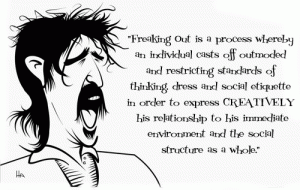The main street running through the city looked deserted. I thought it was the perfect time to show my friends riding with my how my car burned rubber in several gears. With a pop of the clutch, the tires were squealing, smoke was flowing and we were laughing our heads off.
Our momentary fun was suddenly cut short by the sudden glare of spotlight followed by flashing red and blue lights. The street was not as deserted as I had hoped.
The officer had me produce the required paperwork. He had me dead to rights for excessive noise and several other potential violations. After a few moments of watching me sweat, he let me off with a warning. It was the first time that ever happened.
I was a model driver the rest of that night and for the next few years. There was always the specter of the officer in the back of my mind which reminded me of what I needed to do. Although he let me off, I was paranoid he’d show up clear out of the blue.
With affairs, you may be one of those thinking that by forgiving the cheater, you are letting them off. The weird thing is that forgiving them is not what lets them off.
What let’s off the cheater is when you yell at them. The more intense the yelling, cussing and name calling, the more you let them off. The irony is that by ‘letting them have it’, you actually end up providing them a sudden catharsis. That incident helps them ‘let go’ of their guilt. Your yelling was their punishment.
What you thought was ‘punishing them’ actually gave them a quick release of emotional pressure and guilt. Your yelling cancelled out their guilt. What you thought was inducing pain ended up giving them an emotional release.
Giving the cheater a ‘quick release’ from their pain short-circuits whatever changes their own conscience would have come up with.
There are some affair recovery gurus who want you to start with forgiveness or something else.
But I teach the opposite of that. Forgiveness is good, but it’s not where you start. Starting with forgiveness is a no-go and so is giving the cheater a ‘quick release from their guilt. The cheater needs the guilt and conviction to pressure them. They need the pangs of it pricking them. It’s only when they are under pressure that real lasting change occurs.
This is just some of what I cover in the Affair Recovery Workshop.
Best Regards,
Jeff

















One Response
A reader wrote to me about some questions she had in response to the article. I thought that everyone would benefit from part of my response to her, which clarifies and goes into more details on the letting them off versus forgiving the cheater.
“Forgiveness is not about letting them off. It’s more about you choosing not to hold a grudge.He still needs accountability. With the addictive behavior, he needs even MORE accountability. It’s not that he’s a child, its just that when the action starts, he reacts rather than thinks.
It’s okay to be angry with what’s happened to you. You may need to let him know how angry you are and where that anger is coming from. He needs to know about the hurt and fears that you experienced. He needs to know that others have been hurt by his choices.
He needs to know that his ‘living for today’ has limited the opportunities for your children and their options. When he considers the ripple effect of his choices, he may make better ones.
As to your anger. What’s important in expressing your anger is avoiding violence. It takes some practice to express anger without attacking or resorting to violent act. Use the energy of the anger in motivating you to action.
He needs an accountability where he considers the consequences of his choices before making them. You shouldn’t forget what he’s done. If you let him off too easy, it only encourages him in continuing the pattern he’s been in. Letting him off is NOT forgiveness. Acting like nothing has happened is a way of letting him off.
Forgiveness is also about restoring your relationship with him, NOT about condoning what he’s done. When you said “… I don’t think it’s forgivable what he has done how could I ever be forgivable.” you were absolutely correct. On my blog, I wrote a post on what is not forgivable. You forgive the person, NOT the behavior. What he did is not forgivable.”